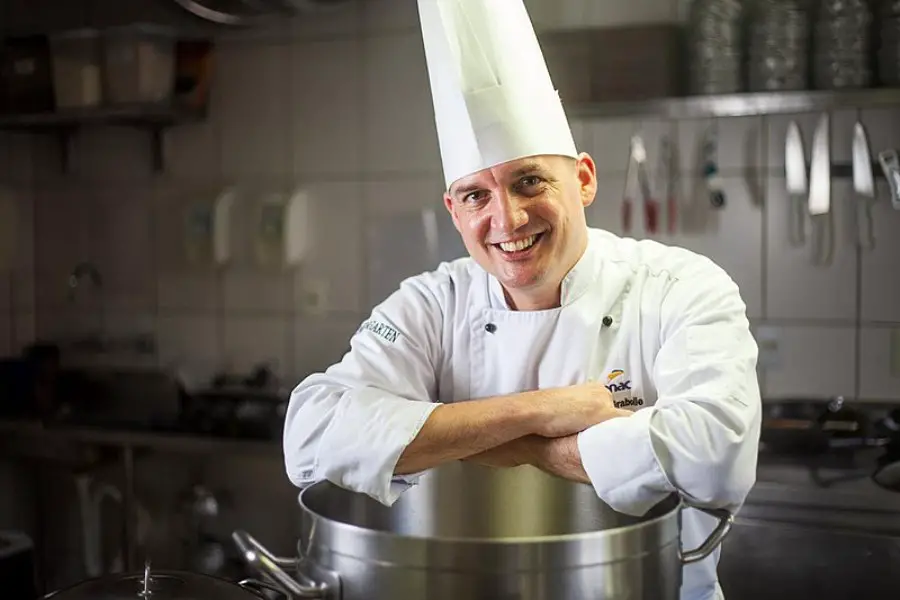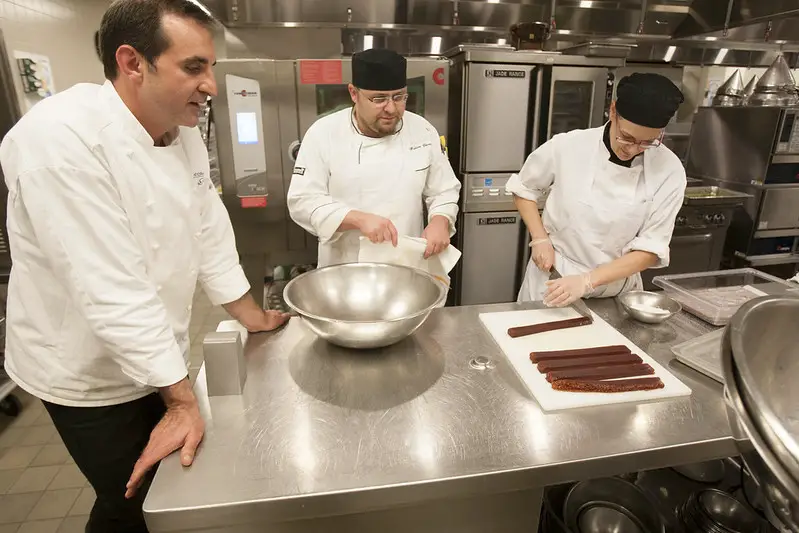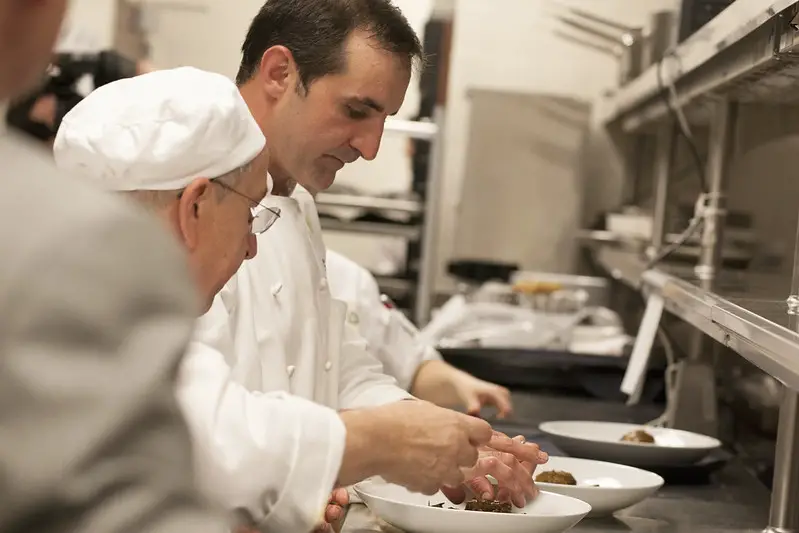
This office doesn’t come by chance, you’ll have to earn it. Those who have held this position can tell what it took them to get there.
The intricacies involved in this office, cannot be over-emphasized. It takes complete hard work to arrive at this post.
A caterer on this seat, (the office of the executive chef), must be knowledgeable, cuisine-wise.
In an organization, there are levels of positions, and definitely, positions will start from the bottom to the top.
There’ll always be an opportunity for a junior employee in an establishment, to one day become a manager in that firm.
However, one will have to obtain the necessary training, experience, and education to be qualified.
There have been situations where someone gets into a company as a junior employee, and through hard work, and self-development, that individual at a point in time in the history of that establishment, held a managerial position.
Even if you are employed directly as a manager in a firm, or employed as a departmental head, the fact remains that you’ve gone through a process which has developed you, and made you competent for the position which you hold.
There is a process that builds someone for a managerial or executive position. One will have to experience elementary, high school, and then a university institution.

Photo: flickr
A Literate/Educated Position
The unique thing about this position is that it has its qualifications. You’ve to be competent to be in this office.
It’s like the top of a ladder, you’ll have to “climb to get there”.
Have you seen where the job of an executive chef is being advertised? Have you read the job description for an executive chef?
If you have, then you should have a clearer picture…
The reason why certain education for certain fields is pursued and attained is that one can be qualified or competent.
The personality in this office is one that allowed itself to be molded in the process of education and culinary experience.
This personality has sat under lecturers and learned academically. The academic knowledge has helped to prepare him/her for this role.
The Beauty of education when attained will always reflect when the time comes to prove it.
The office of an executive chef is a position one has to be qualified for.
The experience and knowledge gained in school will enable this chef to executive this office managerially.
To be a manager of this sort, education is as important, as experienced culinary knowledge.
Duties OF The Culinary Manager
Some hospitality establishments can have one, two, or more kitchens.
On resumption of duty, this chef has lots to attend to, in terms of its task. The task of the executive chef will vary depending on the size of the establishment.
So, the size of the establishment does determine the scope of tasks this chef will perform.
Some of these establishments may have a pastry kitchen, larder kitchen, banquet kitchen, main kitchen (hot kitchen), or butchery in one building or premises.
Basically, these will be the duties of the culinary manager:
Routine Inspection: The executive chef usually picks up his/her clipboard, and proceeds to various kitchens in the establishment, observes the operations, relates with workers, and continues inspection.
This chef discusses with the CDP about work-related duties, and makes notes on it’s clipboard.
The chef checks that staff adhere to dress code standards of the establishment, or are dressed professionally.
Storage facilities like vegetable walk-in chillers are places this chef will spend some time inspecting, ensuring that items in the facility are properly stored or arranged.
Temperature levels of storage facilities will be examined by the chef during a routine inspection.
This allows for the chef to check stock levels, rotation, make notes for requisition of items
Date-dot on items, the chef will examine to ensure they are up-to-date.
Stock/ Inventory: This is done at the end of each month, or quarterly, the chef will instruct staff to carry out an inventory of all stocks in their department and submit the report.
Menu Planning/Development: This is where the position of an executive chef will reflect their knowledge, cuisine-wise.
These tasks are some areas where the chef spends time in his/her office, and kitchen section chefs (pastry, larder, culinary), will be with the chef to make input regarding their section.
Purchase/Ordering: This area shows that the task of this culinary manager can be very demanding. The chef must be vast in knowledge of food commodities and certain operational materials.
He/she should be conversant with the price of items for budget purposes
Budget: The culinary manager ensures the budget for its department minimizes waste and maximizes profit for the establishment.
Companies are set up to grow in business, profitability is the motive behind any business that is set up.
Food Production: In this area, the executive chef will definitely display their flair or passion for the job. This is the heart of the job.
Their skill is outstanding, and junior chefs can attest to this.
Recruitment: This chef has the responsibility to recruit staff for its department.
Kitchen Staff Work Schedule: The kitchen manager will usually assign this task to the sous chef, unless otherwise.
Staff roster documents should be presented to the executive chef by its assistant for review.
Food Safety/Quality: This chef will carry out quality standard checks of ingredients and cooked food.
The chef will ensure that food handlers understand the importance of food safety and maintain HACCP practices.
Record Keeping: The chef will maintain documentation of kitchen transaction papers, and invoices — waybill of items supplied will be filed for record purposes.
Staff Career Development: Programs that involve staff career development are another area this chef will attend to.
The chef will enlist workers for certain training for career development and the company will take care of the cost.
Health/Safety: Safety at the workplace is important, this chef ensures that staff understand the need to undertake their task using personal protective equipment where necessary and maintain good health conditions.
Workplace Sanitation: This chef ensures the cleanliness of the work environment is maintained at all times.
Food Service Line: This is a stage this chef will always love to be in. Dishes coming out from the kitchen should be at their best regarding quality and presentation.

Image: flickr
Exemplary Work Man
This chef lives by example at the workplace — they ensure being a role model to junior chefs.
Aside from their bookwork, they demonstrate their knowledge and experience to their subordinates.
Aside from their office work, they cook with junior chefs to demonstrate their wealth of experience.
This chef can tell the smell of good cooking, they know the taste of good food. They display their plating skills at all times for you to learn from.
The chef manager is there to correct things should he/she notice lapses. This chef is ever-ready to explain and give answers when there are questions from junior cooks.
This caterer notices if one demonstrates good cutting skills, and is ready to teach junior chefs cutting techniques.
This chef can tell if a chopping board is properly placed, if the board shifts during usage, this chef tells you to place a damp napkin under the cutting board so it doesn’t shift when working on it
Their experience is inexhaustible…
A Managerial Team Member
Unlike their subordinates, this is the area that makes an executive chef outstanding. The role they handle puts them at a respected level in an establishment.
As departmental heads, their position is a sensitive one, as they’re answerable for decisions made regarding their department.
While other chefs are involved in split shifts, this chef is usually on a daytime shift. As a departmental head, this factor distinguishes this chef.
This culinary manager represents the kitchen when there are meetings for departmental heads.
Remarks:
To work at this level as a culinarian will depend on how one develops itself. …there’ll be opportunities for development.
This is not an entry-level position, but a commis who is ambitious and dedicated can attain this level if he/she has the right focus.
Secular education and culinary skills developed over time can put one on the path to achieving this.
Hospitality businesses are expanding by the day, making the position for this role to be available from time to time.
Culinary students should understand that there is no automatic route to get to be a chef manager, they’ll have to work and study hard if they intend to attain a prestigious position.
The hospitality businesses of this age have lots of opportunities for chefs in this category.

